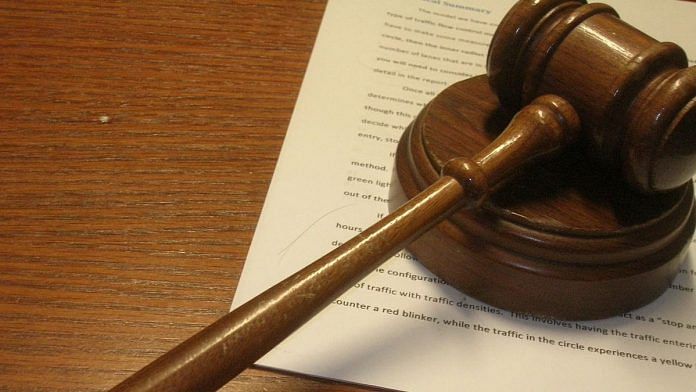New Delhi: Over 16,500 cases with a claim value of over Rs 497.861 lakh crore are currently stuck in Delhi’s three Debts Recovery Tribunals (DRTs) because of inadequate infrastructure, a report submitted to the Delhi High Court shows.
Of these cases, 8,104 are pending in DRT-1, 4,156 in DRT-2, and 4,634 in DRT-3, the report, submitted by the Debts Recovery Appellate Tribunal (DRAT), shows.
The DRTs, which come under the Union finance ministry, are quasi-judicial bodies that enable banks and other financial institutions to recover debts in a timely manner. The DRAT, on the other hand, deals with appeals against orders passed by the DRTs. These bodies were set up under the Recovery of Debts Due to Banks and Financial Institutions Act (RDDBFI) 1993.
The report, submitted to the court last month, also says in DRT-3 alone, the recovery value of 650 of the pending cases is over Rs 100 crore each. It adds that the total claim in these cases stands at Rs 4.24 lakh crore.
Taking note of the “large pendency of cases and large quantum of monies lying locked in litigation”, the Delhi HC asked the Union finance ministry, which was made a party to the case, to consider the issues in the report so that “claimed monies are freed-up to be made freely available in the stream of commerce for augmentation of the economy”.
In its order on 20 December, a bench of Justices Najmi Waziri and Gaurang Kanth directed the ministry’s joint secretary to file “a comprehensive affidavit” on courts’ and litigants’ concerns over the efficiency of court proceedings and also suggestions for increasing the number of tribunals.
The Delhi High Court was hearing a petition filed by a woman who approached the court to have her suit in DRT decided expeditiously.
Advocate Sanjeev Bhandari, who is assisting the bench in the case as an amicus curiae, told ThePrint that three DRTs in Delhi are insufficient to tackle the mounting cases. “We need about 10-15 new tribunals in Delhi itself to deal with the backlog of cases and also to ensure that there is time-bound disposal of matters as envisaged in the relevant statutes,” Bhandari said.
Then there’s the problem of continued virtual hearings — while Delhi’s other courts have reverted to regular in-person hearings, the national capital’s DRTs continue hearing cases online, mainly because of staff shortage, said Bhandari.
Under the Debts Recovery Tribunal (Procedure) Rules, 1993, the tribunals’ powers are limited to settling cases that pertain to the payment of unpaid money from non-performance assets (NPAs). The law gives tribunals the power of a district judge.
Section 19 (24) of the RDDBFI envisages the completion of such proceedings within 180 days of a party approaching the tribunal.
Also Read: Low IBC recoveries are a worry. But solutions lie in cutting court delays, not blaming CoC
The petition
Petitioner Indu Kapoor’s case amply illustrates the condition of Delhi DRTs.
Last year, Kapoor had sued financial institution AU Small Finance Bank for having allegedly claimed possession of an unmortgaged property.
She first moved the HC in February, claiming that there was no presiding officer in DRT-1, and an officer from DRT, Allahabad, was hearing pending cases in the Delhi court. Kapoor’s lawyer Gaurav Srivastava told ThePrint that this officer wasn’t hearing regular court matters but was only entertaining urgent applications.
The Delhi HC had then issued directions to DRT Allahabad to fast-track her case.
But the orders were complied with only to a certain extent — although pleadings in the case were completed, the case was never listed for final hearing, Srivastava said.
Subsequently, in an October petition before the Delhi High Court, Kapoor wanted her suit of illegal possession against AU Small Finance Bank to be transferred from DRT-1 to DRT-3.
“After waiting for four months we again moved the HC in October, urging it to transfer the case from DRT-1 to DRT-3 in Delhi, which has a regular presiding officer,” Srivastava said, adding that meanwhile, a new presiding officer was appointed in DRT-1.
However, a notification issued by the Union finance ministry complicated things for Kapoor — the order amended the jurisdictions of the three DRTs, which meant that DRT-3 could now only hear cases having a claim value of over Rs 100 crore.
For Kapoor, this meant her case could no longer be heard at DRT-3.
‘Flouting’ the law
At the hearing of Kapoor’s petition, amicus curiae Bhandari gave the HC photos to highlight the state of Delhi’s DRTs. The photos, which Bhandari claimed to have clicked during a visit to the tribunal, showed chairs dumped in one courtroom and bags containing case files in another.
When asked about this, DRT officials told the court that renovation was currently underway, prompting the bench to ask the DRAT to file a status report on the repair work. The court also asked it to address the issue of storage and disposal of case files as well as the progress on digitisation of records.
The current pace of work at the DRT goes against the 180-day mandate in RDBBFI Act, Bhandari told ThePrint.
“Virtual hearings began in March 2020 due to the onset of Covid. While all other courts and judicial fora have reverted to physical mode, DRT continues to hear cases digitally due to vacancies and inadequate staff,” Bhandari, who is likely to give his report on the condition of DRT on the next date of hearing, told ThePrint.
(Edited by Uttara Ramaswamy)
Also Read: What critics of Insolvency and Bankruptcy Code get wrong about the recovery model



